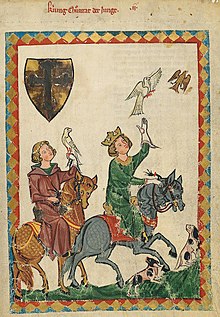Conradin
| Conradin | |
|---|---|

King Conrad the Younger, from the
Codex Manesse (Folio 7r), 14th century |
|
| King of Jerusalem | |
| Reign | 21 May 1254 – 29 October 1268 |
| Predecessor | Conrad II |
| Successor | Hugh I |
| King of Sicily | |
| Reign | 21 May 1254 – 29 October 1268 |
| Predecessor | Conrad I |
| Successor | Charles I of Naples |
| Duke of Swabia | |
| Reign | 21 May 1254 – 29 October 1268 |
| Predecessor | Conrad III |
| Successor | Rudolph II of Austria (titular) |
| Born |
25 March 1252 Wolfstein Castle near Landshut, Bavaria, Holy Roman Empire |
| Died | 29 October 1268 (aged 16) Naples, Kingdom of Sicily |
| Burial | Basilica di Santa Maria del Carmine, Naples |
| House | Hohenstaufen |
| Father | Conrad IV of Germany |
| Mother | Elisabeth of Bavaria |
Conrad (25 March 1252 – 29 October 1268), called the Younger or the Boy, but usually known by the diminutive Conradin (German: Konradin, Italian: Corradino), was the Duke of Swabia (1254–1268, as Conrad IV), King of Jerusalem (1254–1268, as Conrad III), and King of Sicily (1254–1258, de jure until 1268, as Conrad II).
Conradin was born in Wolfstein, Bavaria, to Conrad IV of Germany and Elisabeth of Wittelsbach. He is sometimes known as Conrad V of Germany. Though he never succeeded his father in Germany, he was recognized as king of the Germans, Sicily, and Jerusalem by German supporters of the Hohenstaufens in 1254.
Having lost his father in 1254, he grew up at the court of his uncle and guardian, Louis II, Duke of Upper Bavaria. His guardians were able to hold Swabia for him. Jerusalem was held by a relative from the royal house of Cyprus as regent. In Sicily, his father's half-brother Manfred continued as regent, but began to develop plans to usurp the kingship.
Little is known of his appearance and character except that he was "beautiful as Absalom, and spoke good Latin". Although his father had entrusted him to the guardianship of the church, Pope Innocent IV pursued Conradin with the same relentless hatred he had against his grandfather Frederick II, and attempted to bestow the kingdom of Sicily on a foreign prince. Innocent's successor, Pope Alexander IV, continuing this policy, offered the Hohenstaufen lands in Germany to King Alfonso X of Castile and forbade Conradin's election as king of the Romans.
...
Wikipedia
